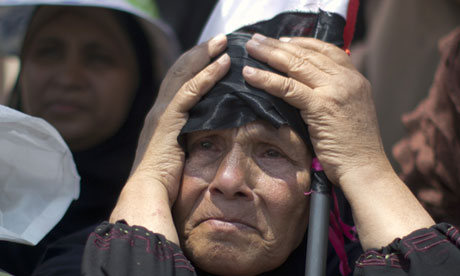Morsi supporters fear return of persecution as dozens die and hundreds are injured in street battles across Egypt
Martin Chulov in Cairo

A Morsi supporter at
Cairo’s Rabaa al-Adawiya mosque yesterday. Islamists promised more
protests today. Photograph: Mahmud Hams/AFP/Getty Images
Running battles in central Cairo and elsewhere in the country on Friday night, which claimed 36 lives and caused about 1,400 injuries, took place despite pleas from Brotherhood clerics for rallies in support of Morsi to remain peaceful. Concerns grew as senior members of the group – those who hadn't been detained by the military – said there was a growing realisation among members that Morsi's political career would not be resurrected and that the Brotherhood's foray into political life has been crushed.
Mohamed ElBaradei, the former head of the International Atomic Energy Agency, had been due to be sworn in as interim prime minister on Saturday night, according to the state news agency. But the appointment of the liberal politician, who has spent decades living in the west, was mired in confusion with a spokesman for the presidential office saying consultations were continuing and the appointment had never been certain.
Some Brotherhood supporters are now predicting a return to the movement's outlawed days, in which they were a strong organising force among communities who supported them, but faced decades of persecution from leaders, including Hosni Mubarak, who kept them far from power.
Facing arrest and a return to life as an underground movement, few leaders were prepared to be publicly identified. Their remarks were more pointed than in the days immediately following the coup, when senior officials had urged restraint and reconciliation. "There is no turning back for the Brotherhood," said one senior member of the Shura Council, the upper house of Egypt's parliament. "We have to raise the stakes to ensure we get out of this safe and intact. We must ensure that we will not be isolated politically and from society and we must demand the return of the elected president, Morsi."
The clashes in central Cairo erupted after a crowd of around 4,000, carrying banners of Morsi, crossed the "6 October" bridge just before sunset. They were met on an overpass near Tahrir square by anti-Morsi demonstrators, who had been celebrating at the site of both of Egypt's latest revolutions. There were reported to have been clashes in Alexandria and Luxor, and skirmishes in several rural areas that had been strongly supportive of Morsi during his troubled and truncated year in office.
Battle lines have not yet been drawn and nor is there yet a consensus among leaders about what to do next. "There is no vision for the Muslim Brotherhood at the moment," said one leader. "Go ask the governing body what the next step is. The army is not talking to the Muslim Brotherhood. It is deadlocked. There is no end in sight." An army colonel, who declined to be identified, said there was confusion in Brotherhood ranks about whether to stick with public diplomacy, or to take their anger to the streets. "The Muslim Brotherhood's show of force is meant to add pressure on the army and security apparatuses to reach a settlement, such as avoiding mass arrests or arrests of leadership figures, or ensuring the MB will not be sidelined from the new government or upcoming elections," he said.
"The problem with this tactic, however, is the MB is losing popularity in public. As their pro-Morsi protests turn violent, the MB risk … becoming ostracised by society."
At the Rabaa al-Adawiya mosque in east Cairo; outside the nearby Republican Guard headquarters, where Morsi and his aides are being detained; and near Cairo University, Brotherhood supporters insisted that they would remain on the streets until the move by Chief General Abdul Fattah al-Sisi to oust Morsi is overturned. The new interim president, the chief judge of Egypt's constitutional court, Adli Mansour, was scheduled to move into the presidential palace on Saturday, in another tangible sign that Morsi is well past the point of no return.
"We will never accept that," said Magid Helawi at the Rabaa al-Adawiya rally. "It is not his to occupy." Ahmed Aref, a Brotherhood spokesman, said: "Our vision – the Muslim Brotherhood vision for the coming period – is to back the legitimacy of the president and to hold our ground in the street. We call for more rallies and will not deal with the usurping authorities. We have refused to speak [with them] and demand any talk be with the president alone. We reject the decisions of the coup plotters. The defence minister cannot oust the president and install a judge in his place."
Though traffic remained unusually subdued on the last day of the weekend in Cairo, there was little tension on the streets. Tanks guarded wealthier districts and the police, who had been absent during Friday's clashes, were deployed near key bridges across the Nile. Senior officials spoke of concern that other Islamic groups, without the hierarchical structure of the Brotherhood, might prove more difficult to contain if clashes continued in coming days.
Gamaa Islamiya, an Islamist group, said it had proposed to hold a referendum over whether Morsi should be returned. Its spokesman said it had chosen not to get involved in any protests. Mohamed Soffar, a professor of political science at Cairo University, said there appeared to be few options for Islamist groups in the coming weeks. "Violence is an option but not the only option," he said. "The Islamists are now trying to find a way ou
No comments:
Post a Comment